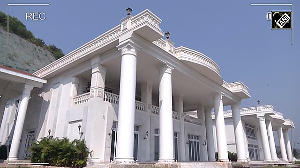A self-proclaimed "professional opportunist," Samuel Zell founded his privately-held investment outfit Equity Group Investments with Robert Lurie, a fraternity brother, in 1968. The duo started out buying up cheap real estate throughout the US from distressed owners, and then kept buying when values recovered and boomed.
Zell made his first appearance on the Forbes 400 list of the richest Americans in 1986, with a net worth of $200 million. Twenty years later, he's worth $4.5 billion and is heavily invested in his three real estate investment trusts: Equity Residential, Equity Office and Equity Lifestyle. Shares in Equity Residential are up 25 per cent since January; Equity Office shares are up 40 per cent, and Equity Lifestyle is up 9 per cent since the beginning of the year.
In Pictures:
Sam Zell's five investing rules
Best ETFs for the current market
At 65, Zell is far from slowing down. "I could be on a beach, but I can't wait to get to the office every day. Risk-taking is like a giant jigsaw puzzle."
Here are some of Zell's favorite current investments and his thoughts on their long-term prospects.
Covanta
A few years ago, Zell got a call to from someone working on the bankruptcy of a waste energy firm called Covanta. Intrigued, he set out to learn the garbage business. He learned that on the supply side, raw material (trash) is always free, and the trend is toward "more garbage than less." On the demand side, there is always a need for collection and landfills.
Zell raised some capital and merged Covanta with a Zell-controlled entity. Long-term, Zell is excited about the waste-to-energy plants he has acquired. "I'm the replacement for landfills. I'm on the right side--the green side--of the issue."
American Commercial Lines
Before investing in barge builder and operator American Commercial Lines, Zell studied the history of barges. He discovered that there had been a barge-building boom in 1979. With a 25-year typical lifespan, many barges were going to have to be scrapped around 2004, meaning companies would soon be forced to buy expensive new barges.
In short, supply and demand could soon be in his favor because ACLI would be in a prime position to start booking orders to build new barges. He decided to buy up a block of the company's bond in 2002. It was a risky investment: The company was deeply in debt and was forced into bankruptcy in 2003.
In Pictures:
Worst ETFs for the current market
Stock picks for all risk levels
American Commercial went public two years later, and shares are up 320 per cent since. Zell says with the cost of steel rising, the company's existing fleet now is worth more. Accordingly, he expects the stock to continue to rise.
Anixter International
Zell invested in this communications and specialty wire company in January 1987 when the company had $600 million in revenue. Today sales are $4.6 billion and continuing to grow. The company dominates the market for Ethernet cables and other wiring needed to hook computer networks together.
The company is also the dominate player in the standards (industrial fasteners) industry. "In their arena, they are like Kleenex," Zell says. The company's stock is up 75 per cent over the past year.
Homex Development
This homebuilding company for low and middle class Mexicans caught Zell's eye 10 years ago. Homex impressed him because the demand for low cost housing in Mexico is virtually unlimited: there is a four million unit housing shortage. Zell says Homex's sales office in Guadalajara is open 24 hours-a-day, 7 days-a-week--and is always filled with first time home buyers. The stock is up 75 per cent over the past 12 months.
Brazil
Zell says the most interesting international opportunity for US investors is Brazil, comparing the country today to Mexico in 1996 when the country began fixing its finances. When Mexican debt was finally rated investment grade in 2000, it was a boon for investors.
Today Brazilian bonds are two notches below investment grade, and Zell says that the anticipation of the rewards of Brazil getting to investment grade is "incredible." He also believes that now the President Lula da Silva has been reelected, Brazil will continue to lower interest rates. Plus, Brazil has "180 million people, huge resources and a great work ethic," he adds.
One company he's watching: Brazilian middle-income homebuilder Gafisa, whose shares are traded in Sao Paolo. Zell says there will be more direct investment opportunities as more Brazilian companies go public.
In Picture:
World's youngest billionaires






 © 2025
© 2025